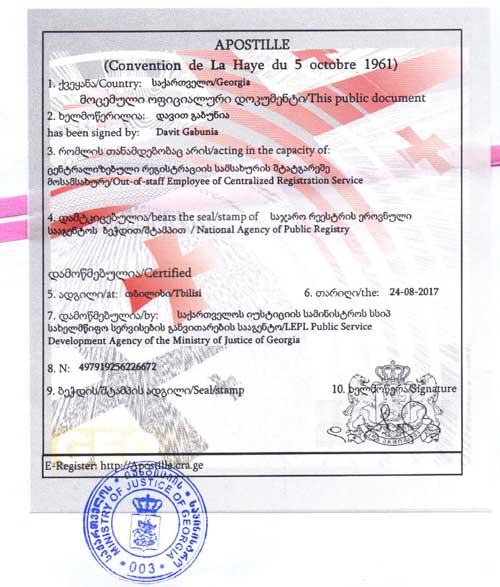
Schmidt & Schmidt covers the full spectrum of legalization services for documents issued in Georgia.
Georgia joined the Hague Convention on the Simplified Authentication of Documents on 21 August 2006; the Convention entered into force on 14 May 2007.
The apostille, or the “Hague apostille” is a certificate that authenticates the origin of a public document (e.g., a birth, marriage or death certificate, a judgment, an extract of a register or a notarial attestation). It confirms the authenticity of the signature and the authority of an official who signed the public document.
Documents issued in Georgia and certified with an apostille in accordance with the Hague Convention of 1961 are recognized in all Member States of the Hague Convention and do not require any other form of certification, such as consular legalization, which considerably reduces the costs and time required for the certification of documents. So far, more than 120 states have joined the Convention.
The apostille is not sufficient for use in the states that are not party to the Hague Convention. In this case, consular legalization applies to a public document.

Designated Competent Apostille Authorities in Georgia
In Georgia, several entities have been designated as competent authorities for issuing the Apostille. The Civil Service Development Agency, under the Ministry of Justice of Georgia, is dealing with authentication of all public documents, except for diplomas, educational documents, and documents issued by the Service Agency of the Ministry of Internal Affairs of Georgia.
For matters concerning diplomas and other educational documents, the National Center for Educational Quality Enhancement, which is part of the Ministry of Education and Science of Georgia, acts as a competent authority. Meanwhile, the Service Agency of the Ministry of Internal Affairs of Georgia handles documents specifically issued by them, a responsibility they've held since 1 August 2010.
The authorities will carefully examine the document to verify if the signatures, stamps, or seals align with their own records. If they are confirmed to be authentic, the document will be legalized by affixing an 'apostille' (an officially stamped certificate).
The apostille in Georgia is a square stamp in Georgian and English with the obligatory heading "Apostille" and a reference to the 1961 Hague Convention in French (Convention de La Haye du 5 octobre 1961). The apostille certificate’s sides will be at least 9 centimeters long.
Types of documents
| Can be apostillized | Cannot be apostillized |
|---|---|
|
|
Specific aspects and document requirements for the apostille in Georgia
Georgia is among the 120 countries that recognize and issue apostilles in accordance with the Hague Convention of 5 October 1961. The apostille serves as a confirmation of the official status of a document.
The apostille process can vary depending on the sender and recipient country, but typically to obtain an apostille for a document in Georgia, you must go through the following steps:
- Obtaining the original document to be apostilled;
- Verification of the signature on the document by the authorized body;
- Issuance of an apostille on a document by an authorized body;
- Submission of the document together with the apostille in the recipient country.
This process can be time-consuming, especially if it includes multiple documents and different countries. To ensure a smooth and accurate apostille process, it is recommended to seek guidance from specialists familiar with the requirements and procedures. Their expertise can help avoid delays and errors in obtaining documents apostille.
Document requirements that might apply:
- The document must be an original or a certified copy issued by the competent authority.
- The document should contain all relevant and accurate information.
- The document must be in the official language of the issuing country or translated into the official language of the country where the apostille is sought.
- The apostille must be affixed by the designated competent authority in accordance with regulations.
The apostille is issued in a uniform format. In Georgia, it has the form of a printed sticker with a handwritten signature of an official, an official seal, and a hologram.
In cases where apostilles are not recognized, holders of foreign documents will need to legalize them instead. However, If the country of destination of the document recognizes and issues apostilles, then legalization is unnecessary.
Legalization of Georgian educational documents for use abroad
For educational documents issued in Georgia, such as school reports, university degree certificates, transcripts of records, enrollment certificates, and other school or university certificates, to be recognized and valid abroad, they must undergo an authentication process through legalization.
When it comes to the authentication of diplomas and similar educational documents, the Ministry of Education and Science of Georgia has designated the National Center for Educational Quality Enhancement as the competent body. Before any Georgian document is legalized by the Georgian Consulate, it must have first completed intrastate legalization procedures in the relevant foreign country.
Such an approach ensures that educational documents possess the necessary legal authority, allowing them to be recognized and used across various countries. While these are general procedures, the exact requirements may vary, so it is advisable to confirm the specific steps with the relevant authorities.
Recognition of the authenticity of public documents
Georgia is part of a Minsk Convention on Legal Assistance and Legal Relations, which pertains to Civil, Family, and Criminal Matters. Members of the agreement are: Armenia, Belarus, Kazakhstan, Kyrgyzstan, Moldova, the Russian Federation, Turkmenistan, Tajikistan, Ukraine, and Uzbekistan.
Consular legalization of Georgia documents for use abroad
Consular legalization is the process of authenticating or certifying a legal document so a foreign country's legal system will recognize it as with full legal effect that is carried out by the diplomatic or consular mission of the country in which the document is to be used.
This procedure is required when the destination country does not recognize or accept the apostille certification. One needs to submit the original document, along with any required copies or supporting materials, to the respective consular office. The consular officials will review the document, verify its authenticity, and affix their seal or stamp to certify its validity.
The consular legalization process may require additional steps like obtaining translations of the document into the language of the destination country or providing additional supporting documentation as requested by the consular office.
In general, to legalize documents in Georgia you will need:
- The document intended for legalization.
- A valid identification proof, like a passport or an ID card.
- If someone else is applying on behalf of the original applicant, a proxy form is required, accompanied by the ID card of the representative.
It's essential to ensure the correctness and completeness of the documents, as the Consulate holds the right to decline the legalization request when:
- Only a translated version of the intended document is submitted.
- Documents presented aren't eligible for legalization.
- Submission of an incomplete document.
- If the presented document requires translation.
- The absence of a stamp or signature or discrepancies when compared to the standard in the registry.
- If the document wasn't issued by the consulate's authorized body.
- Failure to provide all necessary documents.
It is up to the diplomatic mission to decide about the authentication procedure
The specific requirements and procedures for consular legalization may vary depending on the regulations of the destination country.
The main differences between an apostille and consular legalization of documents
The common feature between apostille and consular legalization is that they authenticate an official document for presentation to institutions in another country. However, they have many differences.
| Apostille | Consular legalization | |
|---|---|---|
| Legal effect | Can be used in all countries that are party to the Hague Convention on the Simplified Legalization of Documents. | Use between States one or both of which is not a member of the Hague Convention, or where one of the contracting States has protested the accession of the other. |
| Difficulty | Moderate. To obtain an apostille, contact the competent apostille authority of the state of origin of the document. | High. For consular legalization, various inland authorities and a diplomatic mission of the state of destination must be involved. |
| Pre-certification | Usually not required. | Is obligatory. |
| Attestation at the state of destination embassy in the state of origin of the document | No need to contact the Consulate of the country of destination. | Is the final step of legalization. |
Apostille and consular legalization in all cities of Georgia
Schmidt & Schmidt provides apostille and consular legalization services for public documents originating from all regions across Georgia. We handle the entire process, from document review to obtaining the necessary certifications, ensuring that your documents are valid and recognized internationally. With our reliable services, you can confidently use your Georgia public documents abroad.
Procurement of documents from Georgia
If the important documents are lost or damaged, or current copies of the documents are needed, the re-issue of the documents is required. It is not unusual for people outside Georgia to encounter difficulties with obtaining new documents when abroad. Our consultants will help you procure new documents from Georgia remotely, and we can arrange for your documents to be sent by courier anywhere in the world.
Certified translation of documents from Georgia
Copies and transcripts of civil status documents can be translated into any language by a sworn translator in Georgia or the translation can be done in the country of destination. We offer certified translations of civil status documents with further certification. The cost of the work is calculated according to the volume of the document in question.
Does the translation have to be apostillized?
Any foreign document issued in one country and used in another country must be legalized for use abroad. Therefore, the authenticity of a certified translation from Georgia needs to be certified by an apostille. Consequently, many authorities may not accept certified translations from Georgia if the translation has not been properly authenticated in Georgia for use abroad. To avoid this confusion, translations should better be made in the state of the destination of the document.

























































